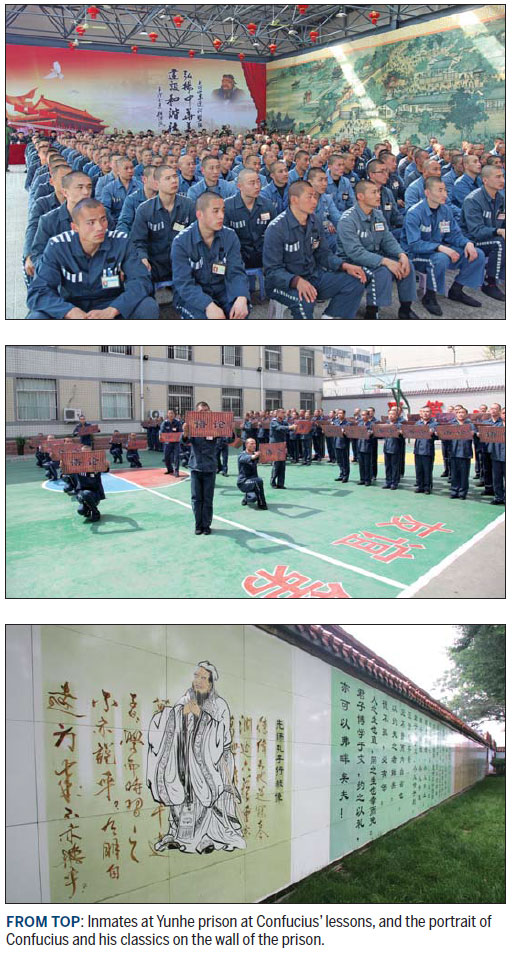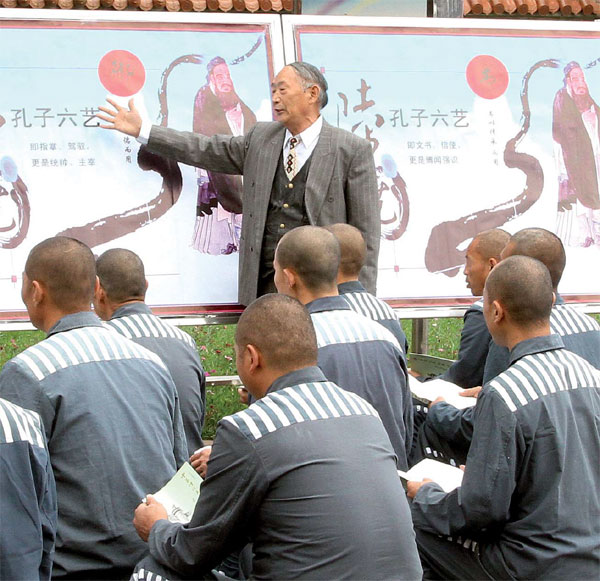Convicts get sage advice to keep them straight
Updated: 2016-10-07 07:45
By Zhang Yi(China Daily Europe)
|
|||||||||
"If we incite people to do good by issuing decrees and meting out punishment, all we shall do is create those who fear the stick rather than those who revere doing right; but if we lead people on a just path with morality, we will breed a people imbued with an awareness of shame and they will submit themselves to governance."
Although those words were uttered by the Chinese sage Confucius about 2,500 years ago, they still have great resonance today, especially for the inmates of Yunhe prison in Shandong province.
In the past 24 years, more than 3,200 prisoners have "graduated" from the Yunhe Confucius Distance Learning College, which offers courses that expound the sage's philosophy and are designed to rehabilitate offenders and prepare them for life outside prison. So far, about 1,000 of the graduates have found work in the low-end technology sector.
|
Liu Fengguang, a professor of Confucianism at Qufu Normal University, gives a lecture on Confucius' teachings to inmates at Yunhe prison in 2011. Photos Provided to China Daily |


The college has distilled the basic concepts of the philosophy into 14 classes, one for each of the known works of Confucius, and it takes about two years to complete the entire course of study. The emphasis is placed firmly on restoring the inmates' sense of right and wrong.
The prison college, established in 1992, was the first of its kind in China. In addition to lectures by prison officers and online classes, Confucian scholars from across the country are invited to visit the prison once a month and teach classes for three days.
"If the prisoners sit around without doing anything, they are likely to get into fights. The idea of providing higher education was the result of a debate about how to make the best use of their time," says Liu Dengcai, the prison's deputy governor.
Although the Confucius teaching project has won plaudits from educationalists and penal experts, when the founders decided to turn their idea into reality, they had a hard time persuading institutions to provide teachers.
"The teachers feared the prisoners would be unwilling to learn anything they taught," Liu says.
Having discussed the idea with a number of colleges and universities in Shandong, Liu and his colleagues eventually decided to work with Qufu Normal University, which provided intellectual support.
Working with university teachers, the prison officers adapted the sage's teachings to produce new textbooks that would make it easier for inmates to grasp the basic concepts of Confucianism.
Liu believes prison managers need to understand the maxim: "Strict punishment and lenient treatment should be complementary to each other in order to maintain good governance."

For the prisoners, one overarching Confucian concept concerning the production of moral individuals is perfect for educational purposes. It requires people to display benevolence, righteousness and propriety, in addition to trustworthiness, loyalty and filial piety.
"I will never forget a lecture given by Bao Pengshan, a renowned scholar of Confucianism. He told us a great man should be one who is able to rectify his mistakes," says Hao Xue (his name has been changed to protect his privacy), an inmate who completed the course at Yunhe in 2010. "Bearing this line in mind, I want to reshape my personality and try to be a man of noble character."
According to Liu, China has a high number of convicted offenders, which means prisons are crowded and maintaining order can be a challenge. Despite that, the courses in Confucianism remain a cornerstone of the approach to rehabilitation in Yunhe prison.
"Most importantly, our main task is to re-educate the prisoners and place them firmly back on the right track," he says.
In 2008, the college achieved a major breakthrough when it was authorized to act as an exam center for students who are unable to take exams in the normal way. Inmates can take the national "self-taught" exam - for those outside the formal education system - while in prison, and the credits they gain can be used as evidence of a reformed character when the authorities are considering the reduction of their sentence.
In recent years, the success of the Yunhe project has prompted six other rehabilitation centers to offer similar courses. The latest was established at Luzhong prison, in central Shandong, in May.
One of the essential Confucian concepts emphasizes conscientious ethical behavior to cultivate close, loving relationships, especially between families, friends and neighbors, according to Wang Hanyu, a lecturer who has taught Confucian philosophy at a number of correctional centers and prisons in the province.
The practice of educating inmates through moral teaching rather than punishment accord with a resurgence of Confucian thought in modern society.
Wang, who is also deputy secretary-general of the Research Society on Confucius Business Theory in Shandong, believes the Chinese word xiao, which means "filial piety", is an important component of the concept that underpins family relationships.
"The concept is firmly rooted in the minds of every person in China and has been adopted by most households nowadays," she says. "It has a huge bearing on every inmate too. It makes it easier for people to empathize with the prisoners, which in turn helps them to return to their families and reintegrate into society when they are released from prison."
Li Xiang (his name has been changed to protect his privacy), an inmate at Yunhe who completed the two-year course in 2012, says he has benefited from the courses.
"I've learned the way a person should behave. As the philosopher said, 'Do not do to others what you do not want others to do to you.'" he says.
"The words of the master have taught me how to treat other people and how to be tolerant in daily life. I want to make reparation to those I hurt before and try my best to repay those who have helped me to rebuild my life."
zhang_yi@chinadaily.com.cn
Who was Confucius?

Confucius (551-479 BC) is the Latinized version of Kong Fuzi, or Master Kong.
His real name was Kong Qiu, and he lived during the Spring and Autumn Period (770-476 BC) when the Zhou kingdom had disintegrated into many de facto independent feudal states, which were subject to the Zhou kings in theory only.
Like many other members of the educated elite, Confucius traveled widely among the states, offering his services as a political adviser and official to feudal rulers and teaching to earn a living.
Although his career as a petty bureaucrat was unsuccessful, Confucius left his mark as a teacher and philosopher. A few generations after his death, first- and second-generation students collected accounts of his teachings and philosophical musings to form the basis of his most famous work, which is widely known in English as The Analects.
In his work, Confucius argued strongly in favor of family loyalty, that children should respect their elders and wives respect their husbands, and that good people should worship their ancestors. From this base, he further propounded his belief that the family unit was the perfect template for successful government.
While many people in China regard Confucianism as a quasi-religion, scholars are divided: some believe that the values he espoused were too secular to allow them to harbor religious undertones, while others argue that the secular nature of his work overshadows the fact that it contains many religious themes. Some academics argue that although Confucius discusses the afterlife and speaks vaguely of a place that could be interpreted as a form of heaven, he rarely talks about spirituality in the accepted modern sense.
Words of wisdom from ancient master
Lead them by means of regulations and keep order among them through punishments, and the people will evade them and will lack any sense of shame. Lead them through moral force (de) and keep order among them through rites (li), and they will have a sense of shame and will also correct themselves.
Wealth and honor are what people desire, but one should not abide in them if it cannot be done in accordance with the way. Poverty and lowliness are what people dislike, but one should not avoid them if it cannot be done in accordance with the way. If the noble person rejects humaneness, how can he fulfill that name? The noble person does not abandon humaneness for so much as the space of a meal. Even when hard-pressed he is bound to it, bound to it even in time of danger.
If the noble person is not serious, he will not inspire awe, nor will his learning be sound. One should abide in loyalty and trustworthiness and should have no friends who are not his equal. If one has faults, one should not be afraid to change.
One who is not humane is able neither to abide for long in hardship nor to abide for long in joy. The humane find peace in humaneness; the knowing derive profit from humaneness.
From: Sources of Chinese Tradition, compiled by W.m. Theodore de Bary and Irene Bloom
(China Daily European Weekly 10/07/2016 page1)
Today's Top News
Theresa May shifts her party toward the center
Security Council agrees on Guterres as next UN chief
Rudd says immigration speech not racist
West may be best for nation's teenagers
Trio wins Nobel chemistry prize for 'nano machines'
IMF sees Brexit damage to British growth
Three scientists share 2016 Nobel Prize in Physics
BRICS need to find their purpose again: O'Neill
Hot Topics
Lunar probe , China growth forecasts, Emission rules get tougher, China seen through 'colored lens', International board,
Editor's Picks

|

|

|

|

|

|








